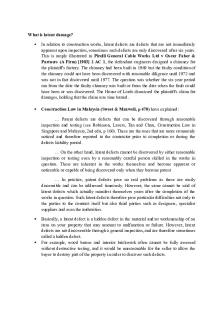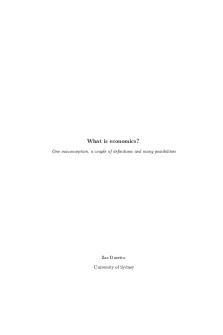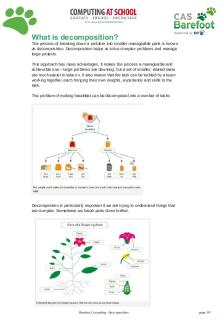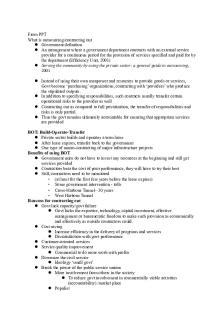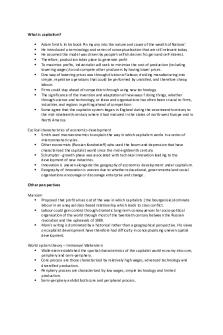What is Politics - Lecture notes 13 PDF

| Title | What is Politics - Lecture notes 13 |
|---|---|
| Course | AN INTRODUCTION TO ARTS AND SCIENCES |
| Institution | Humber College |
| Pages | 4 |
| File Size | 128.1 KB |
| File Type | |
| Total Downloads | 95 |
| Total Views | 164 |
Summary
What is politics and what it is about...
Description
“What is politics … and who cares anyway?” GNED 101 Lesson Notes, by Professor Constantine Belegris Origin of the Term “Politics” The root of the term “politics” is the Greek word polis, which translates into “city-state.” Ancient Greek city states were autonomous, self-sufficient, city-sized communities. The ancient Greek word for “politics” is ta politika, which literally means “city-state matters.” Two Different Definitions of Politics 1. Narrower definition: “politicks is the science of good sense, applied to public affairs” (Fisher Ames, 1758-1808). “Politics involves intentional action within the public realm to achieve particular collective goals” (Herman 1). Only acts following from a conscious aim to realize collective goals in the public sphere are political. In other words, politics is what politicians and activists do. In democracies, the general population engages in this sort of politics during elections. Politics = government practices and conscious action with a view to influencing government practices. 2. Broader definition: politics is about “who gets what, when and how” (Laswell, 1936, quoted in Herman). Any act that is situated in, is determined by, and influences systems of power and of wealth distribution is political. Most of the things we do are unavoidably political – even buying a cup of coffee. Politics = a complex network of interrelated social, political, and economic relations and arrangements. Why Does Politics Exist? Is It Natural or Unnatural? Politics is Natural: Two Perspectives 1. Aristotelian. It is human nature to enter into political relationships. Aristotle said that human beings are by nature political animals. We are naturally constituted to pursue the good life, and to realize all of the conditions necessary for the good life. A political community – people working together toward collective goals – is one of those necessary conditions. 2. Evolutionary. Politics is a product of natural selection. Human beings with an inheritable tendency toward forming social and political relationships and arrangements created conditions that promoted their survival (i.e., the replication of their genes). Human beings without that tendency did not. Over time, then, the tendency to create political associations became a species defining trait. Politics is Unnatural: Two Perspectives 1. Hobbesian. Homo homini lupus est (“man is wolf to man”). Politics protects us from human nature. Human beings are by nature anti-social, violently egoistic, predatory animals, and we need to oppose natural human inclinations by establishing institutions with the power to do so. Philosopher Thomas Hobbes: life in the natural state is “solitary, poor, nasty, brutish, and short.” Politics is necessary to restrain human nature.
2. Marxist. Political institutions exist in order to protect and further the interests of wealthy and powerful groups. They are artificial, historically specific formations, which are only represented as natural to get people to accept them without fuss. Karl Marx adopted this last perspective, characterizing politics as a weapon employed by the upper classes in a class struggle. These perspectives are not the only ones, and people often combine them in various ways. You may find aspects of each of them convincing. Whichever of them, if any, is the most convincing to you will depend upon your political ideology. Political Ideology “Our basic set of beliefs about how the world actually works, on the one hand, and how we think the world ought to work, on the other” (Herman 4). A set of descriptive and prescriptive (or normative) beliefs about the world. We all have a political ideology, whether we are conscious of it or not. Answering questions like “What is the source of wealth inequality?” or “Should there be a minimum wage?” will reveal aspects of your own political ideology to you. Three Basic Political Ideologies: Liberalism, Conservatism, and Democratic Socialism Liberalism (Centrist) Prioritizes freedom (liberty – hence, liberalism): every individual should have as much freedom as is compatible with the same amount of freedom for every other individual. John Stuart Mill’s Harm Principle: the only legitimate restriction on the freedom of any person is that which prevents harm to others. Equality of right: all individuals – regardless of gender, race, gender identity, sexual orientation, class, age, ability – have certain basic rights. Example of rights: John Locke’s natural rights to life, liberty, and property. A violation of any of these rights constitutes harm. Left-leaning liberals believe in equality of opportunity: government ought provide equal access to basic conditions necessary to maximize freedom and protect rights (these might include things like basic health care, minimum wage, etc.) Best economic system: market economy, perhaps with some regulations. Best form of government: representative democracy. Conservatism (Right-Wing) Prioritizes security, order and stability over freedom and rights. Protective of traditional institutions that promote stability: for example, family, “traditional” marriage, religion, established economic practices, laws, customs, etc.
The default position: if it has been around a while, it works, and it if works, don’t change it. Best economic system: free market economy (capitalism). It is the tried and tested system that incentivizes productivity and industriousness. Inequality and hierarchy resulting from market competition is natural and healthy. Best form of government: representative democracy. Democratic Socialism (Left-Wing) The fundamental aim: eliminate gross inequality and poverty. Establishment of equality of condition. Gross inequality and poverty is a result of an unfair distribution of wealth under capitalism. Hence, this economic system must be replaced with one that redistributes wealth equally across all members of society, or at least leaves no one without sufficient wealth for a quality life. Capitalism results in a minority who own almost everything and hardly work at all, and a majority who own next to nothing and do almost all of the work. Best economic system: socialism (collective ownership and management of the means of production, and equal distribution of wealth). Best form of government: representative or direct/participatory democracy. Extreme Variations of the Three Basic Ideologies: Neoliberalism, Fascism, and Authoritarian Communism Neoliberalism Neoliberalism is hard to situate precisely on the ideological spectrum. According to neoliberalism, markets ought to be as free of regulation as possible. To accomplish this, very powerful political institutions are required, which can successfully oppose all efforts to impose any regulations on either domestic or international markets. Neoliberals are pro-free trade, for example, and tend to combat efforts to establish regulations to ensure a living wage and humane working conditions for labourers around the world. Neoliberalism is indifferent to democracy. It supports any regime that promotes the expansion and proliferation of markets, whether democratic or authoritarian. Fascism Fascism is an extreme, authoritarian iteration of conservatism. The traditions it very dubiously identifies as “long-established” and “healthy” are nationalism, militarism, xenophobia, racism, sexism, and homophobia. It rules through fear and brute force. Fascist societies have market economies (although ideologically grounded discrimination tends to strips whole groups of people of all of their rights, including any right to market participation).
Fascist regimes are anti-democratic dictatorships, usually with some “strong man” holding absolute power. All political institutions are transformed into expressions of the leader’s personal will, which is supposed to be one with the will of the nation. Authoritarian Communism Authoritarian communism transforms a socialist principle of wealth distribution into a principle of the total management of wealth – along with every aspect of social life – by an authoritarian government. Like fascist regimes, authoritarian communist regimes are non-democratic....
Similar Free PDFs

Politics lecture notes
- 2 Pages
Popular Institutions
- Tinajero National High School - Annex
- Politeknik Caltex Riau
- Yokohama City University
- SGT University
- University of Al-Qadisiyah
- Divine Word College of Vigan
- Techniek College Rotterdam
- Universidade de Santiago
- Universiti Teknologi MARA Cawangan Johor Kampus Pasir Gudang
- Poltekkes Kemenkes Yogyakarta
- Baguio City National High School
- Colegio san marcos
- preparatoria uno
- Centro de Bachillerato Tecnológico Industrial y de Servicios No. 107
- Dalian Maritime University
- Quang Trung Secondary School
- Colegio Tecnológico en Informática
- Corporación Regional de Educación Superior
- Grupo CEDVA
- Dar Al Uloom University
- Centro de Estudios Preuniversitarios de la Universidad Nacional de Ingeniería
- 上智大学
- Aakash International School, Nuna Majara
- San Felipe Neri Catholic School
- Kang Chiao International School - New Taipei City
- Misamis Occidental National High School
- Institución Educativa Escuela Normal Juan Ladrilleros
- Kolehiyo ng Pantukan
- Batanes State College
- Instituto Continental
- Sekolah Menengah Kejuruan Kesehatan Kaltara (Tarakan)
- Colegio de La Inmaculada Concepcion - Cebu




